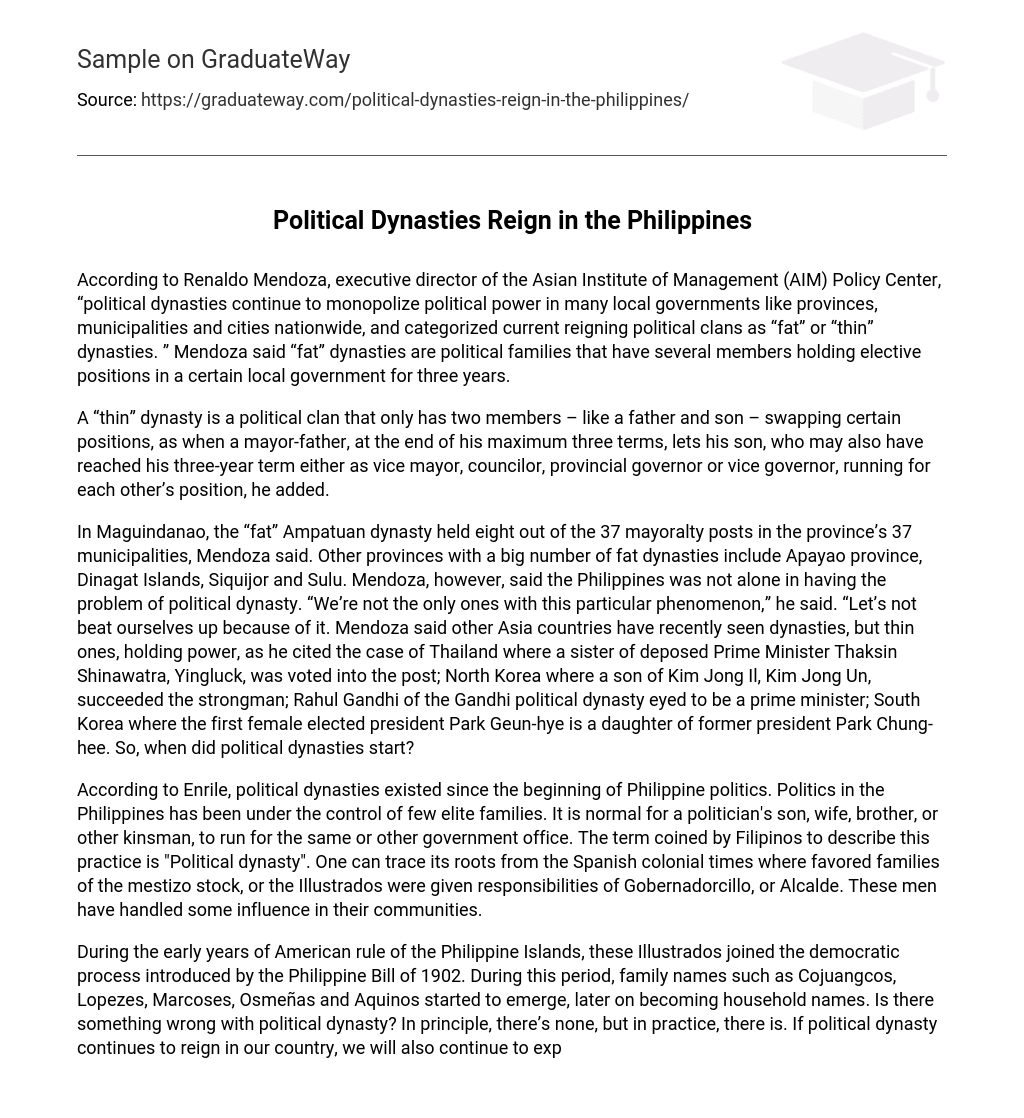According to Renaldo Mendoza, executive director of the Asian Institute of Management (AIM) Policy Center, “political dynasties continue to monopolize political power in many local governments like provinces, municipalities and cities nationwide, and categorized current reigning political clans as “fat” or “thin” dynasties. ” Mendoza said “fat” dynasties are political families that have several members holding elective positions in a certain local government for three years.
A “thin” dynasty is a political clan that only has two members – like a father and son – swapping certain positions, as when a mayor-father, at the end of his maximum three terms, lets his son, who may also have reached his three-year term either as vice mayor, councilor, provincial governor or vice governor, running for each other’s position, he added.
In Maguindanao, the “fat” Ampatuan dynasty held eight out of the 37 mayoralty posts in the province’s 37 municipalities, Mendoza said. Other provinces with a big number of fat dynasties include Apayao province, Dinagat Islands, Siquijor and Sulu. Mendoza, however, said the Philippines was not alone in having the problem of political dynasty. “We’re not the only ones with this particular phenomenon,” he said. “Let’s not beat ourselves up because of it. Mendoza said other Asia countries have recently seen dynasties, but thin ones, holding power, as he cited the case of Thailand where a sister of deposed Prime Minister Thaksin Shinawatra, Yingluck, was voted into the post; North Korea where a son of Kim Jong Il, Kim Jong Un, succeeded the strongman; Rahul Gandhi of the Gandhi political dynasty eyed to be a prime minister; South Korea where the first female elected president Park Geun-hye is a daughter of former president Park Chung-hee. So, when did political dynasties start?
According to Enrile, political dynasties existed since the beginning of Philippine politics. Politics in the Philippines has been under the control of few elite families. It is normal for a politician’s son, wife, brother, or other kinsman, to run for the same or other government office. The term coined by Filipinos to describe this practice is “Political dynasty”. One can trace its roots from the Spanish colonial times where favored families of the mestizo stock, or the Illustrados were given responsibilities of Gobernadorcillo, or Alcalde. These men have handled some influence in their communities.
During the early years of American rule of the Philippine Islands, these Illustrados joined the democratic process introduced by the Philippine Bill of 1902. During this period, family names such as Cojuangcos, Lopezes, Marcoses, Osmeñas and Aquinos started to emerge, later on becoming household names. Is there something wrong with political dynasty? In principle, there’s none, but in practice, there is. If political dynasty continues to reign in our country, we will also continue to experience corruption. Being in politics gives a person the power and influence over his area of jurisdiction including its public resources.
This could be overwhelming to a person and much more to a family with more than one politician. The basic power and influence of a politician tends to widen as the term of office goes on and the existence of people around them with vested interests to obtain the politician’s endorsement and approval. This system in turn overpowers the politician and paves the way to make decisions to the benefits he or she will gain by losing sight of the politicians’ morals obligations towards good governance and uplifting the lives of the less fortunate.
The overwhelming power and influence eventually lead the politicians to become greedy and corrupt. This has been going on and on, never ending, and more of this greediness and corruption could be expected from the existence of political dynasties. To be in politics has become a profitable business in the process. This political system in the Philippines is one of the major causes of the downfall of the country’s economy to the damage of the struggling Filipinos and the whole country. Others reflect on political dynasty as good.
They said, “If the family/families, in the political dynasty, govern or rule our country has/have good intentions and could make or help us live and experience a bountiful life, then that system should continue. But if it’s the cause of corruption in our country, then it should be vanished. ” To stop all the issues about the political dynasty, the government should amend the 1987 Constitution which states, “The State shall guarantee equal access to opportunities for public service, and prohibit political dynasties as may be defined by law.
The state of our country is currently weak and vulnerable to all kinds of “intrusions” from people who want to advance their own personal interests. How could we eliminate or at least minimize political dynasties in the Philippines despite the absence of law? We, the Filipino people who are the backbone of our society, must exercise our right for voting knowledgeably. Let us use our minds and hearts in choosing a candidate and not be swayed by just their popularity, influence, control and money. But, let’s face the reality that not all Filipinos can have this mind-set. Others have fears of consequences if they would go against the tide.
Together however, we can unite and stand to push our Congress to pass a law that would protect our individual and national interests. If only corrective and preventive measures like the anti-political dynasty law could be passed and implemented, greediness and corruption could be minimized. Scarce public resources could be used for more efficient, productive, and effective programs and projects, more employment opportunities and income-generating projects could be available for the less fortunate, and our economy would start to build up and recover to where it was before or even surpass that level.





